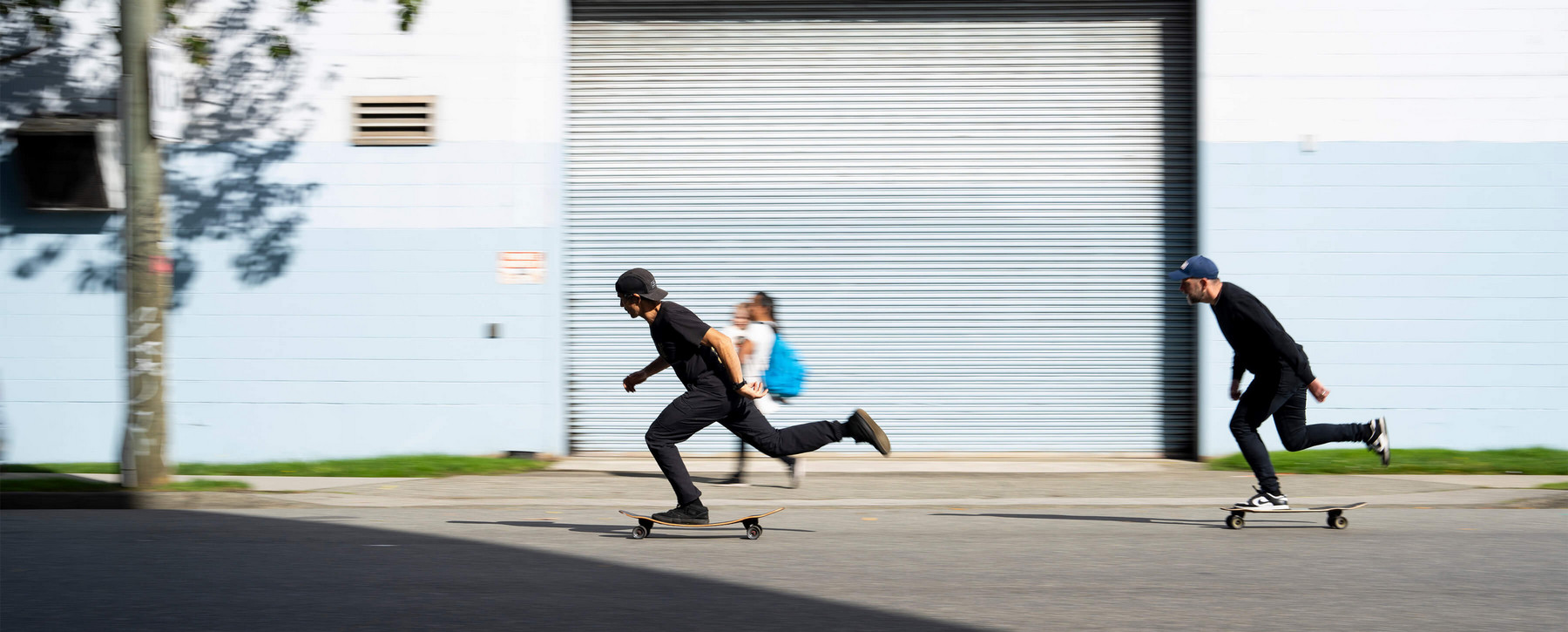Joy rides
December 04, 2024
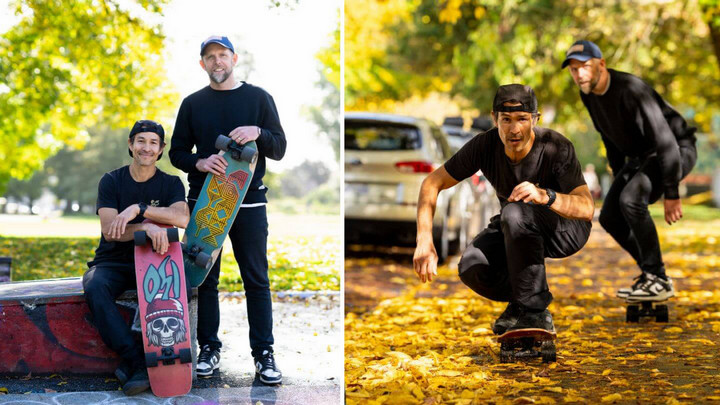
After 28 years in business together, Landyachtz founders and UVic grads Mike Perreten and Tom Edstrand are still on a roll, producing planet-friendly world-renowned skateboards.
It was 1986. Vancouver and its mostly condo-free shores were hosting the World Exposition on Transportation and Communication, known as Expo 86, and along with it the Transworld Skateboarding Championship. It was a sea of tube socks, slip-on Vans and Vision Streetwear T-shirts as far as the eye could see. Teenage skateboard legends-in-the-making Tony Hawk, Christian Hosoi and Rodney Mullen, to name a few, were all there to compete. Thousands of spectators hung on their every ollie, kickflip and rail slide. Gravity-defying tricks were landed, minds blown, DNAs altered—including that of a young kid named Tom Edstrand.
Edstrand and some of his elementary school friends formed a skateboard gang to roll around their hilly West Vancouver neighbourhood. Mike Perreten was among them, and he bought a used skateboard from Edstrand—a rad Skull Skates deck with Gullwing trucks and Kryptonics wheels—a huge upgrade from the clunky Dominion Firefly he picked up from Canadian Tire.
Eventually, the two drifted apart, attending separate high schools. Edstrand got into art and ice hockey, while Perreten barrelled headfirst into downhill ski-racing with hopes of making the Olympics. After graduating high school, Perreten moved to Whistler and spent the next two years racing full time. He considered heading to the US on a ski scholarship but visited some buddies at UVic and was immediately smitten with the campus.
“I was basically living the life of a ski bum with no idea of the real world, so I decided ‘let’s forget skiing and have a change of life,’” recalls Perreten. He enrolled in Geography at UVic, bringing along a skateboard he fashioned from a piece of plywood he picked up while framing houses that summer in Whistler. It was not your typical skateboard. It was longer and more aerodynamic. Plus, it had big soft wheels for more stability and a smoother ride.
An old friend becomes business partner
One day while riding to class, Perreten bumped into his old friend, Edstrand, who was working on an Economics degree with a minor in Commerce. Edstrand also played on UVic’s Ultimate Frisbee team and had just returned from a tournament in California where he noticed a new skateboard phenomenon: longboards, similar to the one Perreten was riding. Rather than pulling off intricate tricks, people were using these new stretched-out skateboards for cruising along the sidewalks and boardwalks of Santa Barbara and Santa Cruz.
Edstrand told Perreten he wanted to make a board like his. As luck would have it, Edstrand’s rental in Cadboro Bay had enough basement space for a workshop. With Perreten’s mechanical knowhow and Edstrand’s artistic and graphic design skills, the duo began pressing longboards out of plywood, using wide trucks and cushy skateboard wheels from the 1980s that were no longer in demand. The students began making boards for their UVic friends, starting up their own skateboard gang again. And like their old West Vancouver days, they used the boards to bomb down the hills of Victoria. They even took turns carving the hills in the affluent Uplands community. “It was just like having a ski hill,” Edstrand recalls. “We were always respectful [to the residents]. We would wave and control our speed and be friendly. We received more looks of shock than disapproval at that point.”
The skateboards were a hit, and the friends realized they might be onto something. For an Entrepreneurship class project, Edstrand drafted a mock business plan for a skateboard company that would become the template for their future business endeavours. “We got a good mark on it, but the prof said, ‘Oh, this is probably not a great business because the margins are not very good.’ Mike and I were young and ambitious and didn’t really care. We went for it anyway.”
The pair got to work over the summer, quitting their jobs and turning a ski cabin into a temporary workshop. They worked long days, designing and fabricating the first run of skateboards for retail. They also settled on a name: Landyachtz, a term intended to denote high-end quality. Since companies in California already made similar style boards but with cheaper labour costs and price tags, they figured the best way to stand out from the competition was to focus on quality over quantity. Their first slogan was “slightly more expensive, way better.”
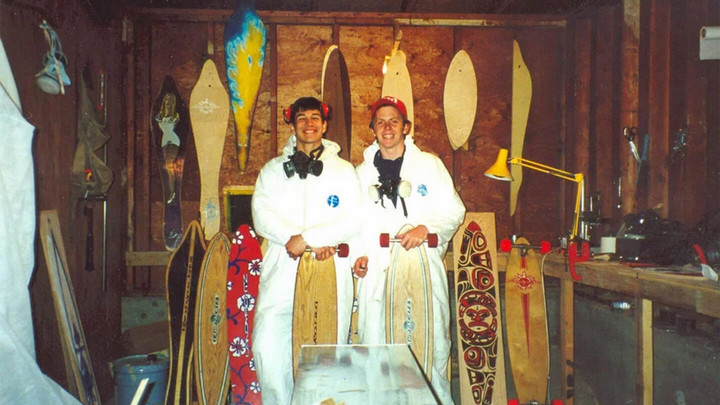
Celebrities get on board
The focus on quality paid off. Over the next few years Landyachtz gained momentum. Their reputation grew along with its foothold in the international market, earning fans such as the late actor/comedian Robin Williams, who purchased several Landyachtz boards from Purple Skunk, a San Francisco skateboard shop. Along the way, Landyachtz moved from various basement workshops and garden sheds in Victoria, to a parents’ garage in West Vancouver, to a space subleased from a North Van snowboard company, to their current digs in a refurbished warehouse in East Vancouver’s Strathcona neighbourhood.
Landyachtz continued to innovate with their skateboard designs, developing signature trucks and wheels and branching into different styles of skateboarding. Landyachtz also established itself as a force of nature in the competitive downhill skateboarding circuit, sponsoring races and riders around the globe. In 2005, Edstrand even won the International Gravity Sports Association longboarding world championship. But the entrepreneurs discovered that Landyachtz’s growing customer base wasn’t just downhill thrill seekers with a need for speed.
“[What surprised me] was how many dads got on board,” Edstrand says. “We would get a lot of people saying, ‘I used to skate, and I want something that’s easier to roll around on when I skate with my kid.’ So, that’s why they got a longboard. The thing with longboards and cruisers… is they appeal to a broad spectrum of skill levels. We’ll have people anywhere from six years old to 60 years old because it’s not as impactful as regular skateboarding.”
Landyachtz’s profile continued to grow through the racing circuit, trade shows and a loyal and vocal following—both in terms of feet on the ground and online presence. (Landyachtz’s YouTube channel currently has 244k subscribers, with many of its videos garnering millions of views each). At its peak, Landyachtz boards were sold in more than 500 stores in the US and available in more than 50 countries.
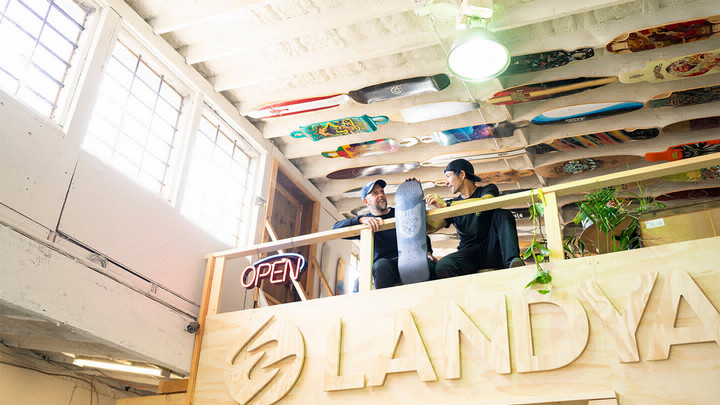
Promoting human-powered transportation
Not wanting to be limited to skateboards, in 2016 Landyachtz ventured into the world of bike manufacturing. It was a natural progression, says Perreten. “One of the reasons we got into making skateboards was that it seemed like such a great way to get around. It’s so efficient, there’s no motor, it just human-powered transportation… and it’s the same with bicycles. Especially if you’re commuting, it’s one thing you can do where you feel like you’re making a positive difference on the planet.”
Their approach to designing bikes isn’t that different from how they make skateboards. It started with a drive to make a nice commuter bike, Perreten says. “So, we designed a bike that was very simple, with good components—kind of the ultimate bike for a short commute.”
Once their line of commuter bikes was launched, other designs followed—road bikes, gravel bikes and custom builds—all with the shared goal of exploring the environment while having a positive impact on the planet.
Today, Landyachtz employs approximately 35 people at its Vancouver and LA warehouses. The friends estimate they’ve sold at least a million skateboards over the years. The sheer number of trees used on their products—in particular maple—is not lost on them. “Mike and I are very not wasteful—frugal, even,” Edstrand says. “Both of us were raised that way. So, there was always a consciousness of the Earth’s resources and making the world a better place.”
Landyachtz teamed up with the organizations Eden Projects, Tree Canada and Priceless Farms, which focus on planting trees and sustainable forestry practices, to establish a “One Board One Tree” campaign. For every skateboard they sell, the company plants a tree.
“Once we dove into it a little more, it became really interesting because you get about 60 skateboards out of a maple tree,” Edstrand says. “So, it’s not just sustaining but this program is increasing the number of trees.”
Balancing act
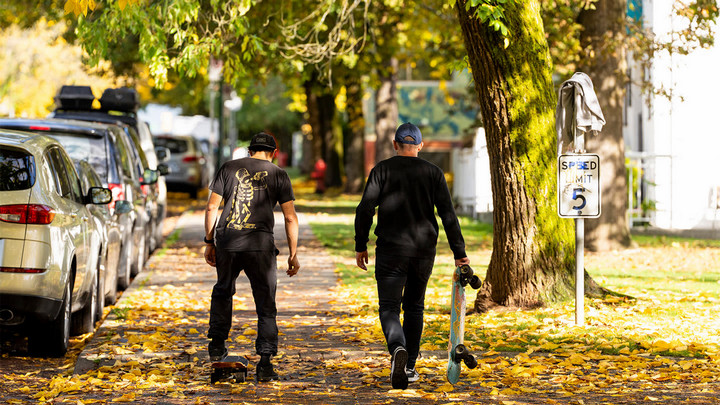
Like any long-running business, Landyachtz has experienced its share of setbacks—the upheaval caused by the COVID-19 pandemic in 2020 arguably the biggest one. But throughout it all, they’ve kept on rolling—both in terms of the business and their unique partnership.
“I spend almost as much time with Mike as I do my wife,” Edstrand says. “So I think part of what’s interesting is how we have been able to work together and figure out our roles, business wise, but also support each other… It’s a different style of business. We’ve been able to complement each other and support each other and help each other grow. It’s about balance.”
Perreten suggests their differences are actually a strength. “We are quite different in a lot of ways, and we therefore gravitate to separate aspects of the business [and] this helps us not overlap roles too much… We solve problems from different perspectives, so some issues that are really challenging for me are easy for Tom and vice versa. Maybe one of the secrets to the success of our business relationship is because we trust each other.”
Trust, balance, self-expression, creatively navigating the twists and turns of the landscape—the metaphors of riding a skateboard are hard to avoid when telling the story of Landyachtz.
For its founders, skateboarding remains not just a business but a way of life. The two still ride regularly, whether it’s to blow off steam during a busy workday or burning around the neighbourhood with a family dog in tow.
“It’s a very simple thrill,” Edstrand says. “It feels free. You wash away all your worries. It’s like when I play hockey, I’m just chasing a little piece of rubber around trying to put it in a net and I’m not really thinking about other aspects [of life] because you can’t. Any day that I ride my board or bike is a better day because of it… [And] when you see someone try skateboarding for the first time they light up. It introduces them to a new world that has a positive impact on their lives. That’s why we do it.”
“It feels so good skating down the street,” Perreten adds. “My dog will sometimes pull me on his leash. I’m carving back and forth… and I have this feeling like, man, it never gets old. It’s such an awesome feeling.”
—Michael Kissinger, BEd ’94
This article appears in the UVic Torch alumni magazine.
For more Torch stories, go to the UVic Torch alumni magazine page.

